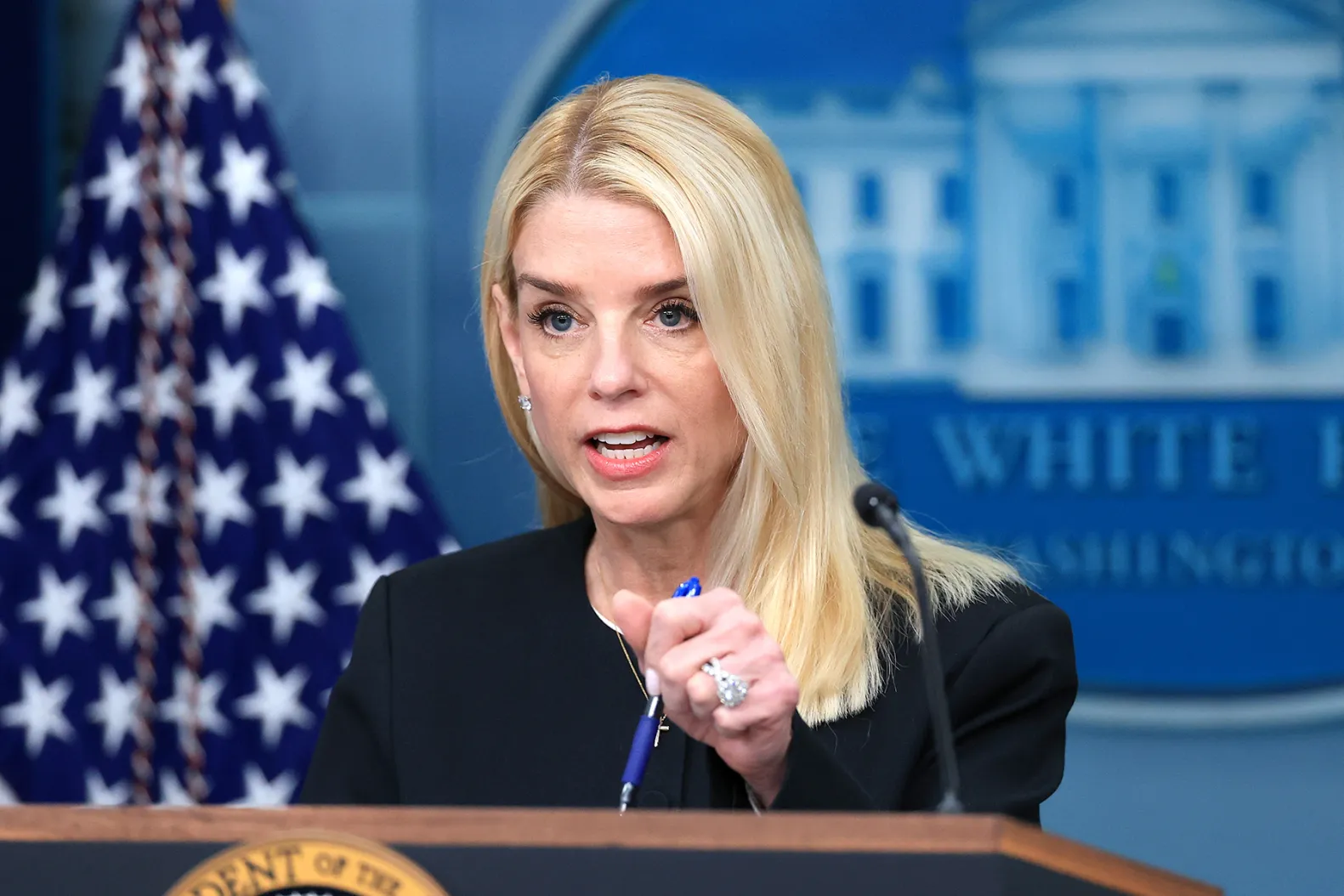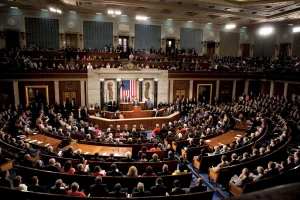Attorney General Pam Bondi on Wednesday delivered the clearest timeline yet for when the public will finally gain access to the long-sealed federal records connected to Jeffrey Epstein — a moment lawmakers in both parties have called one of the most significant forced disclosures in modern history.
Speaking at a press conference in Washington, Bondi said the Justice Department will release all unclassified Epstein-related materials within 30 days of President Donald Trump signing the newly passed transparency bill. The Senate formally transmitted the legislation to the White House earlier in the day, clearing the final procedural hurdle before it reaches Trump’s desk.
The House overwhelmingly passed the measure in a 427–1 vote, and the Senate advanced it under a fast-track arrangement Tuesday night. Trump has already indicated he will sign the bill, calling it a “Great Big Beautiful Bill” and celebrating what he described as a string of Republican victories.
Bondi’s announcement marks the first time the DOJ has committed to a firm timetable — and it effectively starts the clock on a massive information release expected to include internal communications, investigative files, FBI summaries, correspondence, and other materials long shielded from public view.
A Mandate With Teeth: What the Epstein Files Transparency Act Requires
Under the Epstein Files Transparency Act, the Justice Department is required to make all unclassified records connected to Epstein and his longtime associate Ghislaine Maxwell public within 30 days after the law takes effect. That includes:
-
FBI investigative notes
-
Internal DOJ communications
-
Correspondence related to past inquiries
-
Evidence logs and financial documents
-
Any other unclassified files tied to Epstein’s network
However, Bondi emphasized that limited redactions will be allowed in cases where disclosure could:
-
Endanger victims
-
Compromise an ongoing investigation
-
Reveal sensitive information tied to active prosecutions
“We will follow the law,” Bondi said. “We will protect victims, but we will also provide maximum transparency. That is our mandate.”
Why This Moment Matters — and Why It’s Happening Now
For years, the public release of Epstein’s files has been blocked by various legal, political, and investigative barriers. Critics have long accused both Democratic and Republican administrations of protecting powerful figures who were connected to the disgraced financier.
Epstein died in federal custody in 2019 — officially ruled a suicide — while awaiting trial on sex-trafficking charges. Maxwell was convicted in 2021 and is serving a 20-year sentence.
But pressure to unseal the records surged after lawmakers began receiving materials previously withheld by Epstein’s estate. Bondi acknowledged this shift directly:
“Information has come forward,” she said.
“There’s new information, additional information. And we will continue to investigate any leads.”
When pressed to describe the new evidence, Bondi declined, citing an ongoing investigation, but she pointed reporters toward an online post by Deputy Assistant Attorney General Todd Blanche.
The Post the DOJ Won’t Explain
Bondi did not specify which post she referenced, but Blanche wrote on November 13:
“When I interviewed Maxwell [in July], law enforcement didn’t have the materials Epstein’s estate hid for years and only just provided to Congress.”
That statement alone has fueled speculation about:
-
What materials Epstein’s estate concealed
-
How long the DOJ was unaware of them
-
Whether federal prosecutors were missing key evidence during prior investigations
It also raises questions about whether new leads — including connections to influential public figures and major financial institutions — could produce fresh criminal exposure.
A New Investigation Inside the SDNY
Bondi confirmed that she instructed U.S. Attorney Jay Clayton in the Southern District of New York to begin reviewing Epstein’s alleged connections to:
-
Prominent Democrats
-
High-profile donors
-
Major corporate entities
Clayton’s office declined to elaborate on the status of the inquiry.
This renewed focus stands in contrast to a joint DOJ-FBI memo released in July, which stated investigators found:
-
No evidence Epstein was murdered
-
No proof of a “client list”
-
No indication he blackmailed influential figures
-
No basis for any additional criminal charges
Bondi’s insistence that “new information” has surfaced suggests the official narrative may soon evolve.
Trump Signals Support — And Political Stakes Rise
Shortly before the Senate advanced the legislation, Trump celebrated its impending passage on Truth Social, framing the bill as part of a broader wave of Republican successes.
In a lengthy post, he listed what he called recent victories:
-
“Closed borders”
-
“No men in women’s sports”
-
Ending DEI programs
-
Slashing inflation
-
“The biggest tax and regulation cuts in history”
-
“Stopping eight wars”
-
Rebuilding the military
-
And dealing Democrats a “huge defeat” in the shutdown fight
He concluded with:
“MAKE AMERICA GREAT AGAIN!”
With Trump publicly backing the release — and with bipartisan momentum in Congress — the Justice Department now has no path other than full compliance.
What Happens When the Countdown Begins
Once Trump signs the bill, the DOJ must begin preparing the full document set for release. The law requires:
-
A searchable, downloadable, public-facing archive
-
Redaction only when legally necessary
-
Disclosure within 30 days, no extensions
Legal experts say this will represent one of the largest forced transparency actions in federal history.
The release could reveal:
-
Previously unknown communications
-
Financial records and international transactions
-
Names of associates — past and present
-
Notes from agents and prosecutors
-
Summaries of interviews with Epstein’s inner circle
Victims’ advocates have called it overdue. Political strategists say it could become the defining storyline of early 2026.
The Potential Fallout: Who Should Be Worried?
While the DOJ won’t speculate, analysts expect major turbulence across:
-
Politics — especially for individuals previously rumored to have met Epstein
-
Finance — including institutions that handled Epstein’s accounts
-
Government agencies — for how prior investigations were conducted
-
Law enforcement — where major missteps have already been documented
And with new investigations underway in the SDNY, the story may be far from over.

Sarah Mitchell is a bestselling novelist recognized for her insightful and emotionally resonant stories that explore the complexities of human relationships. Originally from Denver, Colorado, Sarah grew up in a family of teachers who nurtured her curiosity and love for storytelling. She studied psychology at Stanford University, where she became fascinated by the intricacies of human behavior—an interest that would later shape her writing career. Sarah’s novels are praised for their nuanced characters, intricate plots, and ability to capture the subtle tensions that define love, friendship, and family ties. Her breakthrough novel, The Spaces Between Us, became an instant bestseller, lauded for its honest portrayal of strained family relationships and the fragile bonds that hold people together. Since then, she has published several works that continue to captivate audiences around the world. Outside of her writing career, Sarah is passionate about mental health advocacy and often partners with organizations to promote awareness and support for those struggling with emotional well-being. Her personal life is quieter—she enjoys hiking in the Colorado mountains, practicing yoga, and spending time with close friends. With each new book, Sarah Mitchell cements her reputation as a writer who illuminates the beauty and struggles of human connection.









